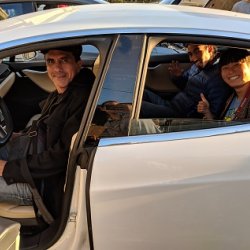“It’s an electric vehicle car show, let’s get some trunks and hoods up!” exclaimed Zach Franklin, GRID’s Chief Strategy Officer, as he kicked off GRID’s recent workshop and showcase the accessibility of electric vehicles (EVs). For EVs, this literal look under the hood holds quite a surprise: where traditional vehicles are packed full with a combustion motor and associated parts, the EVs have a tiny motor and extra storage space, with battery cells running underneath the length of the car.
While this may seem more like a party trick than a paradigm shift, EVs - especially when paired with solar - provide a real opportunity to address climate change, improve local air quality and increase family finances. That opportunity, though, hinges on who has access to these vehicles.
As part of GRID Alternatives’ vision of a transition to clean, renewable energy that includes everyone, we are thrilled to be launching a new initiative to address exactly that question, and help improve equality of access to EVs and their associated benefits for the communities GRID serves.
It’s not hard to see why: low-income families in the US spend approximately $75-$78 billion every year on gasoline. Communities of color are disproportionately impacted by pollution from both gasoline consumption and gasoline production, including disproportionate exposure to airborne lead poisoning from the era of leaded gasoline. By pairing electric vehicles with solar power, GRID is helping families replace gasoline with sunshine, saving them money and replacing local air pollution with clean energy.
The initial focus is on supporting community outreach, helping qualified customers charge their electric vehicles with solar power, and connecting potential clients with the existing programs that assist in implementing low-carbon transportation equity programs. Here in the Bay Area, thanks to grant funding from the Chan Zuckerberg Initiative and the Grove Foundation, we have jumped in to connecting new and current GRID solar clients with at home EV chargers and the incentives to get into a new (or used) EV. We’ve recently installed our first few solar powered electric vehicle charging stations in East Palo Alto, and have more on the way around the Bay Area. We are so grateful to share in our clients’ excitement in this new work!
As always, GRID is heavily leveraging partnerships to best assist in this work. Current partnerships and programs include:
The Clean Vehicle Assistance Program, a new California statewide pilot project administered by Beneficial State Foundation to provide grants of up to $5,000 and loans to low-income consumers to purchase new or used clean vehicles, as well as free Level 2 charging stations for customers who purchase battery electric vehicles.
The Clean Vehicle Rebate Project, California’s main statewide electric vehicle incentive program administered by the Center for Sustainable Energy, that offers higher rebates of up to $4,500 to qualifying low-income consumers
The Clean Cars 4 All Program, a “scrap and replace” program administered by local California air districts, providing incentives through California Climate Investments (CCI) to lower-income California drivers to scrap their older, high-polluting car and replace it with a zero- or near-zero emission replacement. GRID Bay Area was recently selected to provide case management for this program in the Bay Area - stay tuned for more info soon!
In 2018, GRID Alternatives HQ was selected by the California Air Resources Board to administer the One-Stop-Shop Pilot, a clean transportation project that will streamline access to clean transportation-related incentives available to income-qualified consumers in California. With this pilot, we aim to centralize access to information and financial opportunities to help connect frontline communities to the variety of programs and services that are helping make EVs, and their benefits, accessible to all! We look forward to sharing more resources and information soon.
In the meantime, check out photos from our recent workshop. For more information on electric vehicles and equity, visit The Greenlining Institute’s Electric Vehicles for All: An Equity Toolkit.

